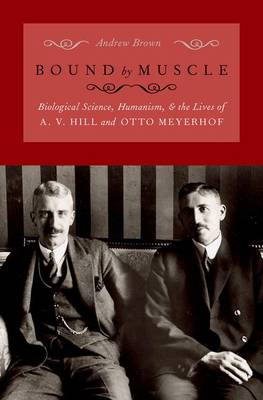
- Retrait gratuit dans votre magasin Club
- 7.000.000 titres dans notre catalogue
- Payer en toute sécurité
- Toujours un magasin près de chez vous
- Retrait gratuit dans votre magasin Club
- 7.000.0000 titres dans notre catalogue
- Payer en toute sécurité
- Toujours un magasin près de chez vous
Bound by Muscle
Biological Science, Humanism, and the Lives of A. V. Hill and Otto Meyerhof
Andrew Brown
Livre relié | Anglais
64,45 €
+ 128 points
Description
In Bound by Muscle, Andrew Brown details the lives and achievements of two physiologists, Archibald Vivian Hill (1886-1977) and Otto Fritz Meyerhof (1884-1951). Hill and Meyerhof shared the 1922 Nobel Prize in Physiology or Medicine for discoveries related to metabolic changes underlying muscle activity. Bound by Muscle describes how Hill and Meyerhof's lives and careers intersected and diverged and how their work changed the course of biological science. Bound by Muscle is organized chronologically. The first four chapters consider Hill and Meyerhof's childhoods and early careers; subsequent chapters address the Nobel Prize nomination and award and how their lives were affected by the World Wars. Bound by Muscle details Hill and Meyerhof's scientific breakthroughs and professional accomplishments. The book also examines the historical context that shaped their work and how the two men differed. Hill embodied the pragmatic style of British science. He became an outspoken critic of fascism as well as an effective humanitarian. As a senior scientist, he played major roles in preparing Great Britain for World War II. In contrast, Meyerhof was shy and philosophical. A non-observant Jew, he was reluctant to leave his superb laboratory in Heidelberg as the Nazi threat became apparent. His dramatic eventual escape is described in detail for the first time. Throughout, Bound by Muscle reflects on how individual differences and historical events have shaped the trajectory of science.
Spécifications
Parties prenantes
- Auteur(s) :
- Editeur:
Contenu
- Nombre de pages :
- 248
- Langue:
- Anglais
Caractéristiques
- EAN:
- 9780197582633
- Date de parution :
- 28-10-22
- Format:
- Livre relié
- Format numérique:
- Genaaid
- Dimensions :
- 163 mm x 238 mm
- Poids :
- 503 g

Les avis
Nous publions uniquement les avis qui respectent les conditions requises. Consultez nos conditions pour les avis.






